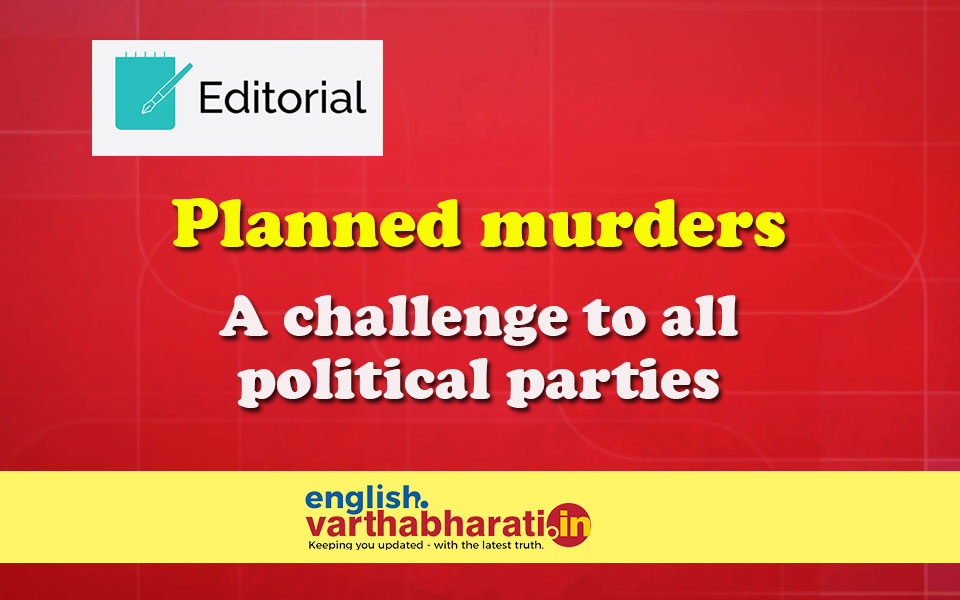Owing to the efforts of Special Investigation Team, a shocking plan made by anti-social elements to kill some of the great thinkers and writers of Kannada has been revealed. Looking at this list, anybody that has some amount of humanity in them would be shocked. Every true Indian, and every political party needs to think seriously about this development that has taken place in Karnataka, to target the rationalists and thinkers of the state. Writer Girish Karnad won the most prestigious Jnanpith award for Kannada. He not only held the name of Karnataka high in the map of Indian literature, he has transcended the map of state and shone bright on the world map too, representing India on international platforms.
Chandrashekhar Patil went to jail, opposing imposition of emergency in mid 70s. Great leaders like Lokanayak Jayaprakash Narayan, LK Advani, Atal Bihari Vajpayee, and others were also jailed during that time. Champa was the president of Kannada Sahitya Parishat and chaired Akhila Bharata Kannada Sahitya Sammelana during his illustrious career.
Prof K S Bhagwan translated Shakespeare’s works into Kannada and continued the rational thinking ways of Kuvempu even after the writer was long gone. Champa and Bhagwan have often issued controversial statements, have influenced thousands of students; and most importantly, they are open to discussion as far as their stances are concerned. Veerabhadra Chennamalla Swamiji is a dalit and has always worked to bring progress into the society with his thoughts and speeches for the empowerment of progressive minds and Dalits. He has focused on religious reforms. Writer and former minister B T Lalitha Nayak has written extensively about the exploited Lambani tribals. She later joined Janata Dal and worked for the empowerment of Dalits and Lambanis. Dr C S Dwarakanath is a lawyer who got doctorate for his work on Kaivara Thataiah. He did phenomenal work during his time as chairperson of the minority commission. Banjagere Jayaprakash is a pride of Kannada and has been known for his poems and activism to empower the working class communities.
Along with all of them, planned attacks have been revealed on rationalist Narendra Nayak since a long time. All of them have contributed immensely to the progressive tag Karnataka wears with pride. They have stood with the voiceless and the exploited, across genders, in their works. One may have differences of opinion as far as their statements are concerned and people are free to accept/debate of distance themselves from such stances of these people. All of them have accepted criticism with grace in the past, while choosing not to resort to a language of derogation themselves in response. All their contribution has been regarded by India should be a matter of pride for Kannadigas.
Further investigation may reveal why their presence is a threat to people who want them dead. Experts have opined this is a wakeup call to for the rest of India to understand this is a massive threat to the cultural identity of India. Such heinous crimes may be carried out against anyone, cutting across partylines too. Politicians need to understand this well because owing to violence incited by such rabid groups in Kashmir, holding elections is a challenge in that state.
One particular ideology, fuelled by religion and politics, is at work there and there would be counter strategies too. This may turn the entire state into a Taliban mainstay. Such rabidity will soon spread to other fields such as Science, films and politics. Hence this bloodbath needs to be ended and every responsible person must raise his/her voice against this. All the parties Including the BJP, Congress, Janata Dal, Communists and Bahujan Samaj Party have to come together to fight against this. Seniors have to caution the youth against taking to violence that may spoil their life. And those persons who are ruining the lives of young men by engaging them in such crimes, have to introspect and see their actions would lead to dark and dinghy corners of the world. This would yield us more crisis than solutions to the differences of opinion they face with the others.
Let the Truth be known. If you read VB and like VB, please be a VB Supporter and Help us deliver the Truth to one and all.
Kalaburagi: Four men have been arrested in Kalaburagi on charge of hacking a man with lethal weapons and pelting stones at him under the limits of Station Bazaar Police Station recently.
According to police sources, Anand Jalak Shinde (34), Ashitosh Jalak Shinde (30), Imran Mehboob Sheikh (28) and Sohaib Anwar Qureshi have been arrested. The men are accused of the brutal murder of Syed Mehboob, a resident of Station Bazaar Upper Line Hamalawadi in the city.
An FIR was filed by the Station Bazaar Police Station based on a complaint given by Syed Ismail, father of the deceased Syed Mehboob.
Following quick probe, the police team successfully arrested the suspects within 24 hours. The arrested men were produced in court and have been sent to judicial custody.
The City Police Commissionerate has appreciated in an official release the police team’s quick solving of the murder case and arrest of the four men accused of murdering Syed Mehboob.





